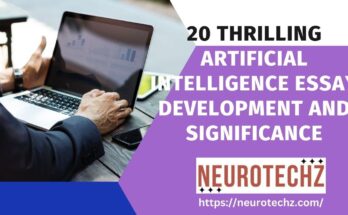Artificial Intelligence Lawyers are revolutionising the legal sector
An essential exchange in criminal offerings is the emergence of the artificial intelligence attorney, which offers improved accessibility, accuracy, and efficiency. This newsletter examines the many dimensions of technology that provide mild capacity benefits, difficulties, and ethical troubles surrounding its utility in the felony subject.
The Rise of Artificial Intelligence in Law
Artificial intelligence has introduced a paradigm shift inside the crook place, historically defined through complex research, copious documentation, and time-consuming approaches. With artificial intelligence in the prison area, Artificial Intelligence Lawyers can address more tricky and strategic regions in their exercise by having the era perform repetitive and information-in-intensity paintings. AI answers boost productiveness by simplifying techniques and enhancing jail research, agreement assessment, and file evaluation.
Critical Applications of AI in Legal Practice
Several industries are undergoing radical trade thanks to artificial intelligence (AI), and the criminal industry is no exception. Efficiency, accuracy, and widespread effectiveness have all expanded dramatically because of the creation of AI technologies in the felony profession. Artificial Intelligence Lawyers are remodelling the way legal professionals function, as this text examines several of the widespread uses of AI in the field.
Document Review and Analysis
Analysing and reviewing documents is one of the primary uses of Artificial Intelligence Lawyers in the legal sector. AI-powered systems can quickly and efficiently analyse large volumes of legal papers and spot pertinent details, trends, and variations. This speeds up the process of reviewing documents and lowers the possibility of human error.
Legal Research
Legal research is being transformed by artificial intelligence (AI) systems with natural language processing capability. The time it would take a human researcher to find complete and pertinent material is significantly reduced by these tools’ ability to sort through vast legal databases, legislation, and case law. Because of this, Artificial Intelligence Lawyers can remain current on the most recent cases and legal advancements.
Analysis and Drafting of Contracts
More and more, contract analysis and writing are using Artificial Intelligence. AI-powered technologies may evaluate contracts for possible risks, inconsistencies, and compliance difficulties to ensure the establishment of legally solid and well-structured agreements. This produces legal documents of higher quality overall and speeds up the contract drafting process.

Benefits of Artificial Intelligence in Legal Practice
The felony enterprise isn’t an exception because artificial intelligence lawyers are increasingly transforming several industries. Recent technological advancements in legal procedures have revolutionised and provided legal professionals with many benefits. Artificial intelligence lawyers have many advantages for the legal profession, from improving decision-making to optimising procedures.
Efficiency and Time Savings
Artificial intelligence lawyers dramatically increase productivity and save crucial time in the legal profession. As mundane and time-consuming duties like document analysis and legal research can be completed more quickly, legal practitioners can concentrate on more strategic and intricate work areas.
Improved Accuracy
AI systems can accurately and precisely process large data sets. Legal processes, including document review, contract analysis, and legal research, produce more dependable results when repetitive operations are automated since human error is less likely.
Cost-effectiveness
Implementing AI in legal practices may save law companies and their clients money. Legal practitioners can deploy their time and knowledge more efficiently when everyday tasks require less labour due to automated methods.
Challenges and Ethical Considerations
People, groups, and communities face many issues in today’s fast-changing and globally linked world, which calls for critically evaluating the ethical ramifications. Due to the ever-changing nature of globalisation, technology, and sociopolitical environments, several concerns have emerged that call for ethical examination. In exploring these issues, this piece will address some significant obstacles and moral dilemmas people and organisations face.
Job Displacement Concerns
Concerns exist over the possible displacement of specific jobs as AI progressively replaces regular duties in the legal profession. However, proponents contend that AI can supplement the work of legal experts, freeing them up to concentrate on more essential duties requiring human judgement and skill.
Bias in AI Algorithms
Because algorithms may contain bias, this is one of the ethical issues with AI in law. Prejudices in legal decision-making may unintentionally be reinforced or made worse by AI systems trained on biased data. Mitigating this worry requires ensuring fairness and transparency in AI systems.
Data Security and Privacy Artificial Intelligence Lawyer
A significant amount of sensitive legal data must be processed to employ AI.Client confidentiality and public confidence in the legal profession depend critically on robust data security protocols and adherence to privacy laws.
The Future of AI in Law
The trend of artificial intelligence in the legal sector suggests that it will only continue to advance. Artificial intelligence is projected to be practised as technology significantly develops. Using AI as a tool to better the overall delivery of legal services and supplement their skill set, legal practitioners are adjusting to this shift.
The Integration of AI in Legal Practices
Thanks to AI’s capacity to manage monotonous activities, analyse massive volumes of data and offer insightful analysis, its use in legal firms has been growing. Legal professionals may also automate repetitive operations with Artificial Intelligence Lawyers, liberating time for extra complicated and strategic legal paintings. Examples of that technology include device getting to know, herbal language processing, and predictive analytics.

AI-Powered Legal Research
Legal research is one area where AI has substantially contributed to law. Artificial intelligence (AI) computers can find pertinent precedents far more quickly than human researchers by sifting through large legal databases and analysing case law.
Artificial Intelligence Lawyers can make better conclusions because of the time savings and improved accuracy of legal research resulting from documents and Contract Evaluation.
Document Automation and Contract Review
AI law firms are streamlining document creation and review processes through document automation solutions. These businesses can considerably save the time and resources usually needed for contract and legal document preparation by automating the process. Further guaranteeing a greater degree of due diligence are AI-driven contract review tools’ ability to spot possible hazards and irregularities.
Predictive Analytics for Case Outcomes
AI-powered predictive analytics entirely transforms lawmakers’ evaluation of possible case outcomes. AI systems can give attorneys information about the possibilities and difficulties of a case by examining past data and trends. This supports clients’ decision-making regarding legal processes and attorneys’ ability to craft more potent legal strategies.
Enhanced Client Interaction
Using chatbots and virtual assistants, AI legal companies are improving client connections. These artificial intelligence (AI) powered systems can arrange meetings, give clients prompt answers to questions, and provide rudimentary legal guidance. Legal practitioners can now concentrate on their business’s more intricate and strategic facets while receiving a better overall experience.
Challenges and Ethical Considerations
Law businesses can reap many benefits from integrating AI, but hurdles and ethical issues must be met. When embracing AI technologies, the legal sector must carefully consider data privacy, algorithmic bias, and the possible displacement of some legal employment.
Summary
An enormous step towards greater accessibility, accuracy, and efficiency has been taken by introducing Artificial Intelligence Lawyers into the legal field. AI, in law, has many advantages, but difficulties and moral issues must be resolved.
Instead of acting as legal experts, artificial intelligence lawyers can be valuable friends who help them overcome the challenges of the complicated legal system. Adopting AI is becoming a strategic need for legal professionals who want to remain ahead of the quickly changing legal landscape, not merely a choice as the business changes.




